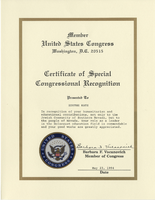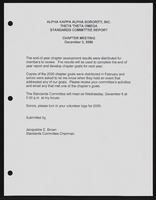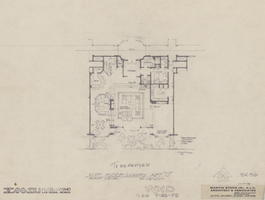Search the Special Collections and Archives Portal
Search Results
Linda Faiss oral history interview
Identifier
Abstract
Oral history interview with Linda Faiss conducted by Claytee D. White on July 13, 2015 for the Boyer Early Las Vegas Oral History Project. Faiss begins by describing her upbringing in Carson City, Nevada before attending the University of Nevada, Reno to study journalism, later working at the
Archival Collection
Alfred J. O'Donnell Jr. oral history interview
Identifier
Abstract
Oral history interview with Alfred J. O'Donnell Jr. conducted by Kenneth "K. J." Evans on October 20, 1998 for the Las Vegas Review-Journal First 100 Oral History Project. In the interview, O'Donnell discusses his parents, his early life in Boston, Massachusetts, and his education at Northeastern University. He then talks about serving in World War II and his work with Dr. Herbert Grier and EG&G, formally known as Edgerton, Germeshausen, and Grier, Inc. O'Donnell recalls the corporation's creation, its function as a United States national defense contractor, and his experiences arming and performing final checks and connections for atomic bombs at the Nevada Test Site. He also discusses public opinions on atomic testing and the transition from atmospheric testing to underground testing.
Archival Collection

Sandy Daly oral history interview
Identifier
Abstract
Oral history interview with Sandy Daly conducted by Bud Stephen on June 20, 1972 for the Ralph Roske Oral History Project. Daly moved to Las Vegas, Nevada in 1947 and she describes her educational experiences and how the gaming industry related to her upbringing. Stephen also asks questions relating to politics, religion, social club membership, theater, recreational activities for children and adults, atomic testing, tourism, local sports, television, prostitution, social class, and the development of the Strip. Interview includes audio recording (analog, digital) and transcript (digital).
Archival Collection

Alpha Kappa Alpha Sorority, Theta Theta Omega Chapter standards committee reports
Date
Archival Collection
Description
From the Alpha Kappa Alpha Sorority, Incorporated, Theta Theta Omega Chapter Records (MS-01014) -- Chapter records file.
Text

Letter from Leo A. McNamee to Alfred Merritt Smith (Carson City), November 6, 1939
Date
Archival Collection
Description
Letter to the state engineer accompanying the application to allow the Las Vegas Land and Water co. access to water on the Las Vegas Ranch. The unsigned application is referenced below.
Text

Architectural drawing, Xanadu Hotel and Casino (Las Vegas), sketches, luxury suite D, January 17, 1978
Date
Archival Collection
Description
Sketch of the proposed Xanadu Hotel and Casino luxury suite D on the 21st floor. Includes handwritten text: "to be revised" and revision dates. Original medium: pencil on tracing paper. The Xanadu was to be located where the Excalibur Hotel and Casino currently sits, but it was never built. Berton Charles Severson, architect; Brian Walter Webb, architect.
Site Name: Xanadu Hotel and Casino
Address: 3850 Las Vegas Boulevard South, Las Vegas, NV
Image

Photograph of Heidi Hamilton, Mark Morgan, and Eileen Price-Kim rehearsing the ballet "Songs of Farewell," Nevada Dance Theatre, Las Vegas, Nevada, 1970s
Date
Archival Collection
Description
Show Name: Songs of farewell (ballet)
Image
Dianna and Gerald Davis oral history interview
Identifier
Abstract
Oral history interview with Dianna and Gerald Davis conducted by Claytee D. White on May 6, 2021 for African Americans in Las Vegas: a Collaborative Oral History Project.
Gerald Davis was falsely arrested on a Sunday afternoon in October 1969, leading to a three-day riot in the Black Westside community of Las Vegas. The Davis' discuss this event as well as their respective backgrounds and past experiences living in Las Vegas, including the businesses they supported, the places they visited, and their employment history.
Subjects discussed include: 1969 riot; Jackson Ave; Officer Arrington; Westside School; and Charles Wyatt
Archival Collection
Albert Risley oral history interview
Identifier
Abstract
Oral history interview with Albert Risley conducted by his granddaughter, Wendy Dalmas, on February 27, 1979 for the Ralph Roske Oral History Project on Early Las Vegas. In this interview, Risley discusses the development of Boulder City, Nevada after his transfer there from Denver, Colorado in 1944. Risley discusses creating a point-based system which was used to assign housing to government employees based on their status and needs. Risley describes life in Boulder City during World War II, and the nearby U.S. Army camp, Camp Williston, which was established to protect Boulder (Hoover) Dam during the war. Risley also describes observing nuclear weapons tests and his later career as a Contracting Officer and Procurement Officer for the Lower Colorado Region after being promoted in 1971.
Archival Collection
